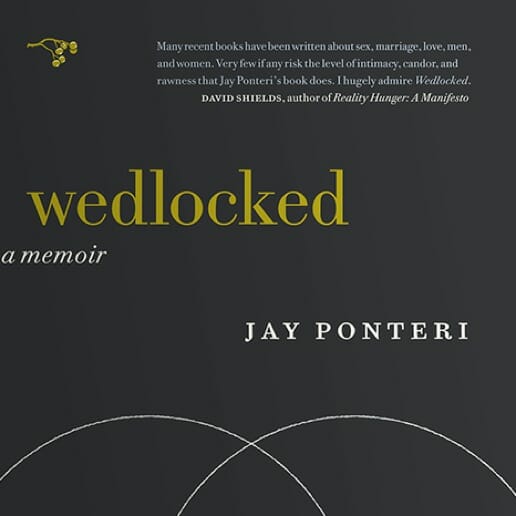Wedlocked by Jay Ponteri

For more than a decade, Hawthorne Books, an independent press in Portland, Ore., has been on the cutting edge of hybrid literature. Writers such as Monica Wesolowska, Scott Nadelson and Lidia Yuknavitch represent varied approaches to the relationship between essay, memoir and narrative, and writers like these make Hawthorne a go-to small press for the playful and the deeply literary. Hawthorne now releases its latest contribution in the world of smart, genre-bending work: Jay Ponteri’s Wedlocked.
Wedlocked is a memoir-essay, an amalgam, a smattered discography of Generation X’s alternative rock icons, Michigan cultural landmarks and Ponteri’s formative artistic and emotional references. David Shields, author of the genre-bending Reality Hunger: A Manifesto, says, “mongrel form is about as exact an emblem as I can conceive for the unsolvable mystery at the center of identity.”
Wedlocked attempts to articulate that “unsolvable identity of self” in the grand tradition of 16th-century essayist Michel de Montaigne, father of the pastiche personal essay. Unlike Montaigne, whose Essais run the gamut from formal to enigmatic, Ponteri does an admirable job of linking his short, essayistic chapters into a narrative about one man’s inability to prioritize his marriage over the life of his mind. His sentences come both scattered and controlled, and readers with a love for how lyricism can flirt with formal narrative essay will delight in his accomplishment.
Still, some readers may be distracted—nay, turned off—by the particulars of Ponteri’s exploration of self. The author presents himself in the role of the husband who desires other women, in particular, Frannie, the chain-smoking red-headed barista at his regular coffee shop. Ponteri’s wife discovers this desire when she reads the pages of an early draft of this very book, which he’s stashed in a mailing envelope in their garage.
So this is a book within a book, a hall of mirrors in which a writer attempts to lay himself bare and show the effect his writing has had on his wife and his life. To do so, he compiles the ingredients of his identity.
Neither Ponteri’s wife nor the redheaded barista can be said to be protagonists in this drama; the lead roles in Wedlocked are the writer, the thoughts that make up the writer’s identity and the ways that a writer’s work can inflict injury on real people. Ponteri turns out to be a product of his references: Zeppelin, The Who, Metallica, Cheap Trick. Nirvana, Archers of Loaf, Charlatans UK, Stone Roses, Superchunk. He cites painter Chuck Close, who says that you must expose your flaws in a self-portrait, and he cites writer Scott Nadelson, whose words he borrows when he tells his wife that their relationship has “run its course.”
The geography of the narrator’s sexual fantasy life—hands hovering over wet panty crotches, the Standing Power Fuck, the hipbone to buttocks rhythm—contrasts dramatically with the un-erotic, angry sex Ponteri and his wife have after she discovers his manuscript: “…no clit play, I’m not in the mood. Just fuck and lie…Mechanical, without feeling.” Ponteri withholds information about his wife—we don’t learn until half through the book, for example, that she’s a painter, an artist in her own right. By the time we find out, the discovery startles—for the first 100 or so pages she’s simply been an angry, micromanaging buzzkill to his daydreams who spends a lot of her time knitting sweaters for their relatives. Her competence insults Ponteri’s psychological paralysis: he admits that he had stopped truly “seeing” his wife long ago. His love for her is one of “endurance and accumulation.”
-

-

-

-

-

-

-

-

-

-

-

-

-

-

-

-

-

-

-

-

-

-

-

-

-

-

-

-

-

-

-

-

-

-

-

-

-

-

-

-








































